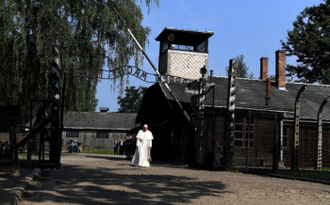Cardinal Parolin: Interreligious dialogue essential to combat anti-semitism

Pope Francis in Auszwitz - July 2016
Source: Vatican News
Cardinal Pietro Parolin, Vatican Secretary of State, gave the concluding remarks in an online virtual symposium held on Thursday afternoon entitled Never Again: Confronting the Global Rise of Anti-Semitism.
The event was hosted by US Ambassador to the Holy See, Callista L Gingrich. In his remarks, the Cardinal brought contributions from Pope Francis, and cited a recently-discovered letter written in 1916 by then-Secretary of State Cardinal Gasparri.
In her opening remarks, Ambassador Gingrich cited the 2018 attack in Pittsburgh, the more recent attack in Jersey City at the beginning of this year and numerous attacks in New York City. "Every free society has a stake in reversing this trend" she said. She then described steps taken by the Trump Administration to address the issue.
Ambassador Gingrich concluded by thanking Pope Francis. Describing him as a "significant ally in the fight against anti-semitism and holocaust denial," she cited remarks he made in January in which he stressed the importance of keeping the memory of the holocaust alive.
She said many Jewish organizations support Pope Francis's decision to anticipate the opening of the holocaust-era Vatican archives and "welcome the availability of the records."
Elan S Carr, US Special Envoy for Monitoring and Combatting Anti-Semitism, reminded participants that anti-semitism is on the rise and is embraced by people all types of ideological camps and religious persuasion. Addressing personal safety issues, criminal prosecution of offenders, promoting the adoption of the International Holocaust Remembrance Alliance, and monitoring online anti-semitic communication while upholding freedom of speech are some of the ways the United States is actively addressing this reality.
Mr Carr said that telling the story of the positive contribution of the Jewish people is another key in combatting anti-semitism. He expressed gratitude to the Catholic Church's "priority" in combatting anti-semitism. Since 2000, he said, the Church's recognition of the importance to educate in Jewish values is helping to replace ignorance and hatred. In this way, the Church is a partner with Judaism in instilling "Abrahamic values" and "godliness" in today's world. Mr Carr also recalled that Pope John Paul II was the first pope to visit Auschwitz and a synagogue and led the way in the Church's ability to embrace her Jewish brothers and sisters.
Lisa Palmieri-Billig, Representative in Italy and Liaison to the Holy See American Jewish Committee, explored the roots of anti-semitism.
She explained that the search for a scapegoat for economic crises in society is common to the persecution against the Jews. This, she said, was true throughout the history of Europe, and is true in the various other geographical areas where anti-semitism now appears. While citing the unfortunate fact that anti-semitism was compounded by the Christian teaching of contempt enshrined in European culture through art, she said she was grateful for the cooperation that various churches are now providing, especially in such areas as education and law.
"The stake .is not anti-semitism alone, but the health and survival of democracy itself." she said, concluding that "interreligious dialogue, cooperation and solidarity" are the positive means to achieve this.
She recalled Cardinal Lustiger's visit to the United States Holocaust Memorial Museum. During that visit he said the survivors of the holocaust, were witnesses to the fact that "hatred leads to death." The mission of the Holocaust Museum is, therefore, very important in helping to preserve the memory of what happened. She too expressed appreciation to Pope Francis for the anticipated opening of the Vatican archives which allow historians to do this work.
Rabbi David Meyer, Lecturer Cardinal Bea Centre for Judaic Studies Pontifical Gregorian University, said that the traditional role of a rabbi is that of comforting people during times of suffering. When thinking of anti-semitism, he shared the verse from the Torah that resonates for him which is repeated both before and after the flood: "the thoughts of the human heart are continually evil" (Genesis 6:5; 8:21) "Is there anything darker", he asked, than the violence the Jewish community has experienced over and over again?
Nonetheless, Rabbi Meyer's asks if this darkness can be "brightened" and "defeated". The answer, he said, is yes, because it has already been done. Beginning with Nostrae aetate, the Catholic Church's teaching of contempt has been transformed into a teaching of respect, thus demonstrating that anti-semitism can be transformed within a society that promoted it. This is a "successful battle." Rabbi Meyer said, from which "practical insights" can be drawn to fight anti-semitism where it is currently manifesting itself. The three tools necessary are: passion, aiming high and audacity.
Cardinal Pietro Parolin, Holy See Secretary of State, provided the closing remarks for the symposium. He echoed Pope Francis's words that any form of anti-semitism is "a rejection of our Christian origins", and is thus a contradiction. Fratelli tutti offers a reflection, he said, on distortions of "fundamental concepts" such as democracy, freedom, indifference, the "loss of the meaning of the sense of history" and racism which are also reflected in anti-semitism.
The Cardinal then quoted a recently discovered document written by his predecessor, Secretary of State Cardinal Gasparri in 2016. It was written in response to a letter from the American Jewish Committee asking for a response to violence against Jews in the context of World War I. Writing on behalf of Pope Benedict XVI, Cardinal Gasparri wrote that the natural rights due to human beings should also be "observed and respected in relation to the children of Israel as it should be as for all men, for it would not conform to justice and to religion itself to derogate there from solely because of a difference of religious faith."
He also cited the reaction to this letter by the American Jewish Committee. They called it a "virtual encyclical", and wrote that:
"Among all the papal bulls ever issued with regard to Jews throughout the history of the Vatican, there is no statement that equals this direct, unmistakable plea for equality for the Jews, and against prejudice upon religious grounds."
Cardinal Parolin then emphasized the place of historical memory stating that "in order to overcome so many deplorable forms of hate we need the capacity to involve ourselves together in remembering. Memory is the key to accessing the future and it is our responsibility to hand it on in a dignified way to young generations."
Cardinal Parolin concluded saying that interreligious dialogue is an indispensable tool to combat anti-semitism. Fraternity, he said, is built on the truth held by various religious that each human person is "called to be a child of God."
"It is my hope that the more Christians and Jews grow in fraternity, social friendship and dialogue, the less anti-semitism will be possible because 'deceit is in the mind of those who plan evil, but those who counsel peace have joy' (Prov 12:20)". Shalom!

















